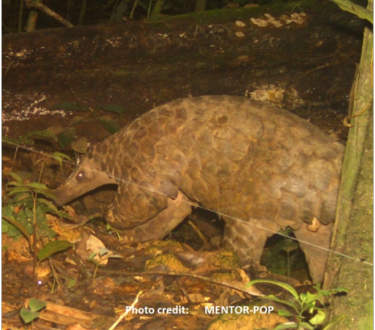
Cameroon last February 17, 2018, joined the international community to commemorate this year’s edition of the World Pangolin Day observed under the theme: Pangolins are the pride of Central Africa and are increasingly being trafficked to Asia. In Cameroon, the Kimbi-Fungom National Park Service in the North West Region organized a sports walk and a football encounter. During the walk, village youths and staff of the Park Service walked round some villages adjacent to the National Park with placards bearing pro-pangolin conservation messages like “Make a Pledge, Save Pangolins”, “Protecting Pangolins for posterity” and others. A similar message was also passed by the different teams involved in the football encounter.
Meanwhile, Cameroon’s Ministry of Forestry and Wildlife used the World Pangolin Day as an avenue to carry out radio sensitization campaigns across the country. During such campaigns, the Ministry educated the public on the threats pangolins are faced with in Cameroon underscoring the urgent need to save them from extinction.
At the level of the social media, campaign content targeted Central African Sub-region, the United States as well as Asian audience. This is because Asia has become a major destination for illegal international trade in pangolins. Using facebook accounts like “PangolinSaver”, “USFWS International Affairs”, “#WorldPangolinDay; #SavePangolins; #ProtectOurPangolins; #pangolins” constituted the main hashtags on this day.
Pangolins are believed to be the most heavily-trafficked mammals in the world. All eight species of pangolins (four species in Africa and four in Asia) are threatened with extinction. Three of Africa’s four pangolin species are present in Cameroon. These include the giant pangolin, the white-bellied pangolin, and the black-bellied pangolin. Very little is known about them and the illegal trade in pangolin bush meat and scales is driving them closer and closer towards extinction.
Instituted in February 2012 and observed every third Saturday of February, World Pangolin Day (WPD) is an international event to raise global awareness about pangolins, the alarming threats they face, and the inspiring efforts to prevent them from going extinct. Cameroon and Central Africa joined the celebrations in 2016, with the launch of the MENTOR-POP Fellowship Program. Championed by the MENTOR-POP Fellows in collaboration with the Cameroon Ministry of Forestry and Wildlife (MINFOF). The first ever WPD was organized in February 2016 and constituted in a simple; sports walk in the city of Yaoundé and Television interviews. In February 2017, more events were organized both at field sites (national parks) and major cities the week running up to WPD 2017. On the eve of WPD 2017, the Cameroon government carried out the first ever pangolin scale burn-in Africa sending a strong message that the trade in pangolins will not be tolerated within its territory.
Until recently, experts estimated that one million pangolins had been poached from the wild over the past decade. New research estimates that up to 0.4-2.7 million pangolins are hunted annually in Central Africa alone. In October 2016, the Convention on International Trade in Endangered Species of Wild Fauna and Flora (CITES) issued a complete ban on all forms of trade in pangolins and pangolin derivatives like scales etc. In Cameroon, national legislation has been updated to reflect this CITES decision, and the commercial trade ban in pangolins and pangolin parts is now being actively enforced. However, a lot of illegal trade is currently ongoing in many areas in Cameroon. Therefore the illegal trade in pangolins needs to be taken more seriously, with improved law enforcement and proper following of judicial proceedings.
By B. Shancho Ndimuh With Contributions from Godwill Echu







